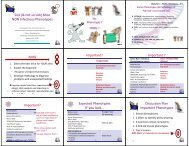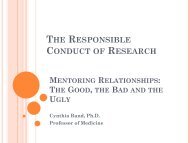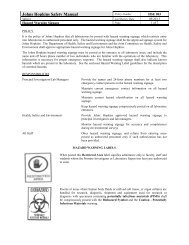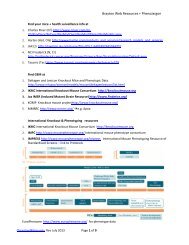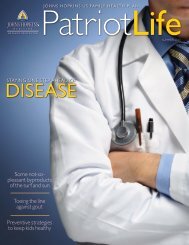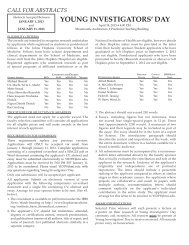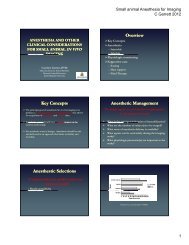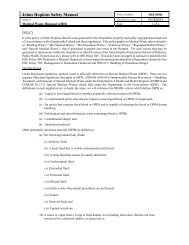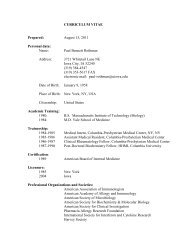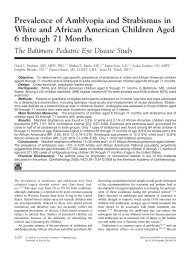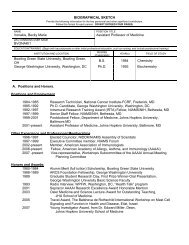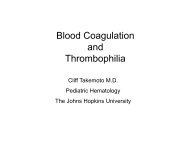APCl1307K: Introduction - Johns Hopkins Medical Institutions
APCl1307K: Introduction - Johns Hopkins Medical Institutions
APCl1307K: Introduction - Johns Hopkins Medical Institutions
Create successful ePaper yourself
Turn your PDF publications into a flip-book with our unique Google optimized e-Paper software.
<strong>APCl1307K</strong>:<br />
<strong>Introduction</strong><br />
The Hereditary Colorectal Cancer Website has been sponsored by the Robert Rauschenberg Foundation<br />
In 1997, a <strong>Johns</strong> <strong>Hopkins</strong> research team found an inherited genetic mutation called APC I1307K. This mutation is found<br />
primarily in people of Ashkenazi Jewish heritage (Jews of Eastern European or Russian ancestry). Researchers believe that<br />
6% of the Ashkenazi Jewish population carries this gene mutation, which gives them a significantly increased risk of<br />
developing colorectal cancer.<br />
Both the APC I1307K mutation and mutations that cause FAP occur in the same gene, the APC (adenomatous polyposis coli)<br />
gene. The APC I1307K mutation is different from other APC mutations because the mutation itself does not cause colorectal<br />
cancer. Instead, this particular mutation creates an unstable spot in the gene that makes the gene more susceptible to<br />
additional genetic changes that may, in turn, lead to colorectal cancer.<br />
Figure 1. Location of the colon in the body.<br />
What is APC I1307K?<br />
Adenomatous polyposis coli is a tumor-suppressing gene that plays an important role in the carcinogenesis of colorectal cancer. If the APC gene is defective it fails to<br />
suppress colon cancer development. The mutation appears to make the gene unstable and prone to acquire mutations during normal cell division. The APC I1307K<br />
mutation is found in Ashkenazi Jews and has not been found in anyone who is not of Ashkenazi descent. This gene mutation causes a substantial increase in the risk<br />
of colorectal cancer (approximately 18–30% lifetime risk). Studies of APC I1307K are ongoing to better understand its role and implications.<br />
Symptoms<br />
Many patients with colorectal cancer experience no symptoms in the early stage of their disease. In fact, many people have no symptoms until the disease is quite<br />
advanced. Therefore, routine colorectal screening and an appreciation of risk factors are extremely important.<br />
Since many of the symptoms of colorectal cancer are also symptoms of a variety of other colon diseases, it is important to see your physician so that the necessary<br />
tests can be run and a diagnosis made.<br />
The following is a list of symptoms that may occur:<br />
Blood in the stool<br />
Diarrhea that is not the result of diet or illness<br />
A long period of constipation<br />
Crampy pain in the abdomen<br />
Change in bowel habits<br />
Persistent decrease in the size or caliber of stool<br />
Frequent feeling of distention in the abdomen or bowel region (gas pain, bloating, fullness, with or without cramping)<br />
Weight loss with no known reason<br />
Vomiting and continual lack of energy<br />
In addition to polyps, abnormalities in other areas of the body may give early clues to the presence of FAP. These abnormalities may include bumps or lumps on the<br />
bones of the legs, arms, skull, and jaw; cysts of the skin; teeth that do not erupt when they should; and freckle-like spots on the inside lining of the eyes.<br />
It should be emphasized that there is no safety in simply waiting for symptoms to develop. It is vital that parents and guardians make every effort to have<br />
examinations of their children starting at age 11 even if they do not have symptoms.<br />
Resources<br />
The American Cancer Society<br />
The American Cancer Society<br />
National Headquarters<br />
1599 Clifton Road, N.E.<br />
Atlanta, Georgia 30329<br />
800-ACS-2345<br />
http://www.cancer.org/<br />
The ACS can offer assistance if cancer should occur. Check the telephone directory for your local chapter.<br />
Hereditary Colorectal Cancer Registries<br />
Registries may be contacted for the names of experts in the management of APC I1307K. Registries can also help to identify relatives at risk for the disorder. Further<br />
information concerning Hereditary Colorectal Cancer Registries may be obtained by clicking here or contacting:<br />
Coordinator, Hereditary Colorectal Cancer Registry<br />
The <strong>Johns</strong> <strong>Hopkins</strong> Hospital<br />
550 North Broadway, Suite 108<br />
Baltimore, MD 21250-2011<br />
Phone: 1-888-77-COLON<br />
Fax: 410-614-9544<br />
E-mail: hccregistry@jhmi.edu<br />
© Copyright 2001-2013 | All Rights Reserved.<br />
600 North Wolfe Street, Baltimore, Maryland 21287
<strong>APCl1307K</strong>:<br />
Anatomy<br />
The colon and rectum are part of the digestive tract. The digestive tract is a hollow tube that begins at the mouth and ends at the anus. It has several parts including<br />
the esophagus, stomach, small intestine, colon, and rectum (the colon and rectum make up the large intestine).<br />
Figure 2. Anatomy of the colon and rectum.<br />
The intestine is about 28 feet long. The last 5–6 feet of the intestine is called the colon or large intestine. This structure has six major divisions: cecum, ascending<br />
colon, transverse colon, descending colon, sigmoid colon, and rectum. The last 5 or 6 inches of the large intestine is the rectum.<br />
The purpose of the digestive system is to remove nutrients (minerals, vitamins, carbohydrates, proteins, fats, and water) from the foods we eat and to store the waste.<br />
After food is digested, solid wastes move through the colon and rectum to the anus, where they are passed out of the body.<br />
© Copyright 2001-2013 | All Rights Reserved.<br />
600 North Wolfe Street, Baltimore, Maryland 21287
<strong>APCl1307K</strong>:<br />
Causes<br />
Family History<br />
The exact causes of colorectal cancer are not known. However, studies have shown that genetics, diet, and lifestyle can affect an individual’s risk of developing<br />
colorectal cancer.<br />
Family history is one of the most significant risk factors for colorectal cancer. People who have cancer, colorectal cancer, non-cancerous colon polyps, or inflammatory<br />
bowel disease are at increased risk of developing colorectal cancer. People who have previously been treated for colorectal cancer are at risk for recurrence. Women<br />
with uterine, ovarian, and breast cancer are also at increased risk.<br />
Genetics<br />
People with APC I1307K have a 50 percent chance of passing the condition to each of their children.<br />
Why Is This Mutation Most Common in People of Ashkenazi Jewish Descent?<br />
Recent scientific studies tell us that certain groups of people, including Ashkenazi Jews, have unique genetic mutations that increase their risk of certain cancers or<br />
diseases. In most cases, doctors who study genetics believe that the first time a gene change occurs in a group of people, it occurs by chance. When this group is<br />
small and separate from other groups, by geography or culture, for example, the gene change may become more frequent from one generation to the next. This is<br />
probably why the APC I1307K gene mutation is most commonly found in people of Ashkenazi Jewish descent.<br />
How Is the APC I1307K Mutation Inherited?<br />
People with the APC I1307K gene mutation have a 50% chance of passing the gene mutation to each of their children. Children who do not inherit the gene mutation<br />
cannot pass it to their own children.<br />
Figure 3. APCI1307K family Pedigree<br />
(1) George has colon cancer and carries the APC I1307K gene mutation. His wife, Susan, does not have the gene mutation. They have three children, George, Jr.,<br />
Stephen, and Carol. All were at 50% risk of inheriting the APC I1307K gene mutation from George. In fact, both George, Jr. and Carol do carry the mutation and both<br />
have developed polyps.<br />
(2) George, Jr., and his wife, Connie, have two children. Both children had a 50% chance of inheriting the gene mutation. Their daughter, Alice, is affected.<br />
(3) Stephen and his wife, Gloria, have two children. Because Stephen does not have the gene mutation, his children had no risk of inheriting the gene mutation from<br />
him.<br />
(4) Carol and Bill have three children. Each child had a 50% chance of inheriting the gene mutation from Susan. Peter and Sally carry the gene mutation, but neither<br />
one has yet developed polyps or colon cancer.<br />
Children who do not inherit the gene mutation cannot pass it to their own children.<br />
© Copyright 2001-2013 | All Rights Reserved.<br />
600 North Wolfe Street, Baltimore, Maryland 21287
<strong>APCl1307K</strong>:<br />
Diagnosis<br />
Genetic/DNA Testing<br />
There is a gene test to look for this inherited gene mutation.<br />
Figure 4. Chromosome 5 showing APC I1307K<br />
The test is performed on a small sample of blood. However, this gene test does not look for gene mutations that cause other forms of hereditary colorectal cancer.<br />
Anyone who is thinking about having a gene test must receive genetic counseling. This is required because there are many issues to consider before testing. Genetic<br />
information can affect different people in many ways.<br />
This gene test is performed at the <strong>Johns</strong> <strong>Hopkins</strong> University Pathology Molecular Diagnostics Laboratory in Baltimore, Maryland, and at a few other laboratories in the<br />
country. The cost of this gene test may vary. Genetic counseling may be required and would be an additional cost. Some insurance companies will pay for genetic<br />
counseling and testing, others will not. People who are thinking about having a gene test done should check with their insurance company before making a final<br />
decision.<br />
A negative gene result can mean that there is a 99% chance that an individual does not carry the gene mutation. This person may still have a mutation in another<br />
gene that causes hereditary colorectal cancer. Other risk factors can be assessed during genetic counseling, where family history, lifestyle, and other issues may be<br />
discussed.<br />
A positive gene result can mean that a person has an estimated 10–20% risk of developing colorectal cancer in his or her lifetime. The APC I1307K test results are<br />
99% accurate. This is only a gene test; it does not detect the presence of cancer or polyps.<br />
Who Should Consider Testing for the APC I1307K Mutation?<br />
Any person of Ashkenazi heritage who has a personal or family history of colorectal cancer or colorectal polyps may wish to consider testing. A family history means<br />
having at least one close family member with colorectal cancer or polyps. Ashkenazi Jews without a family history of colorectal cancer may still wish to obtain genetic<br />
counseling to learn the value of gene testing in their own unique circumstances.<br />
Genetic counseling is available, and recommended, for individuals who may have the APC I1307K mutation, and their family members. Genetic counselors will<br />
explain the inheritance pattern of APC I1307K, discuss which family members are at risk for developing the condition and provide necessary information regarding<br />
genetic testing. Counseling services are available through genetic and oncology departments in many hospitals. To make an appointment with a member of the <strong>Johns</strong><br />
<strong>Hopkins</strong> professional medical team or to speak with someone at the Colorectal Cancer Risk Assessment Service, please call (410) 614-LIFE (5433). Also, it is<br />
recommended that APC I1307K families contact registries for access to resources and for help with identification of at-risk family members.<br />
What Should You Do if You Receive a Positive Gene Test Result?<br />
It is important to detect colon polyps or cancer early. Routine screening is the best way to do this. At this time, experts recommend the following:<br />
Persons with a positive test result, who do not already have colon cancer or polyps, should have a routine colonoscopy every 2 years beginning at age 35 OR 5–10<br />
years before the earliest age at which colon cancer or polyps occurred in the family, whichever is younger.<br />
Patients with a personal history of colon cancer or polyps should have a routine colonoscopy every 2 years, or more often at the recommendation of their doctor.<br />
Relatives of people testing positive for this gene mutation should consider counseling and testing as well.<br />
Genetic Testing and Insurance<br />
With any gene test there is a risk of insurance (life or health) or employment discrimination. At this time there are federal laws that offer protection against<br />
discrimination of people who have medical insurance through a group health plan. Some states have laws to protect people, but the laws on insurance and<br />
employment discrimination vary from state to state. The Americans with Disabilities Act may protect people with a positive gene test from discrimination in the<br />
workplace. These issues can be discussed with a genetic counselor.<br />
Physical Examination<br />
Doctors should keep a detailed history on each patient. This history should include the patient’s personal and family medical history. The physician will perform a<br />
physical examination and may order laboratory tests. Diagnostic tests may also be performed.<br />
Digital Rectal Examination<br />
This is a painless examination of the rectal area. The physician inserts a gloved, lubricated finger into the rectum to gently feel for any abnormalities.<br />
Fecal Occult Blood Test<br />
This is a test for hidden (occult) blood in the stool. The patient is given three small cards and asked to provide samples from three consecutive bowel movements. A<br />
small amount of stool is placed on a special test strip on each card (figure 12). This stool may be tested in the doctor’s office or sent to a laboratory to see if there is<br />
any occult blood in the specimen.
Endoscopic Diagnosis<br />
Flexible Sigmoidoscopy<br />
The flexible sigmoidoscopy is an examination of the rectum and the lower colon. It is done with a lighted, flexible, hollow tube, which is about the thickness of a finger.<br />
The sigmoidoscope is inserted into the anus through the rectum and into the large intestine. Using the sigmoidoscope, the doctor can see whether polyps or cancer<br />
are present (Figure 16). At the time of sigmoidoscopy, a biopsy forceps may be inserted through a channel of the scope to remove a small sample of tissue for<br />
microscopic examination. Sometimes it is necessary for the doctor to introduce air into the sigmoid colon to improve visibility. Most patients feel a little cramping or<br />
discomfort when having a flexible sigmoidoscopy.<br />
Figure 5. Position of the sigmoid scope in the colon.<br />
Before having a sigmoidoscopy the colon must be clear of stool so that the doctor has good visibility. The patient must undergo a preparation that may include a liquid<br />
diet, enema and laxatives to clear stool for the colon. The technique for bowel preparation may differ by health facility.<br />
Figure 6. Patient positioning for sigmoidoscopy and colonoscopy.<br />
Colonoscopy<br />
Colonoscopy is the best way to detect polyps or cancer.<br />
A colonoscopy is an examination of the rectum and the entire colon. It is performed with a lighted, flexible, hollow tube, which is slightly larger in diameter than an<br />
enema tube. Colonoscopy permits the doctor to see much farther into the bowel than sigmoidoscopy. The colonoscope allows the doctor to see whether polyps or<br />
cancer are present.
Figure 7. Position of the colonoscope in the colon for colonoscopy.<br />
A biopsy forceps may be inserted through a channel in the colonoscope to remove a small sample of tissue for microscopic examination. Sometimes it is necessary<br />
for the doctor to introduce air into the colon to improve visibility. Before having a colonoscopy the colon must be clear of stool so that the doctor has good visibility.<br />
The patient must undergo a preparation that may include a liquid diet, enema, and laxatives to clear stool from the colon. The technique for bowel preparation may<br />
differ by health facility.<br />
A sedative is given before a person undergoes colonoscopy. Many people sleep through the whole procedure and feel little or no discomfort. Occasionally, the<br />
insertion of air during the procedure may cause the same kind of discomfort as gas pain.<br />
If a polyp is found, removal through the colonoscope may be sufficient, although surgery may be recommended for some patients.<br />
Figure 8. Endoscopic view of biopsy forceps<br />
Barium Enema<br />
A barium enema x-ray is a radiologic examination of the rectum and the entire colon. Prior to a barium x-ray, the patient may have to undergo a preparation that<br />
includes a liquid diet, enema or laxative to clear stool from the colon. This preparation may differ from exam to exam and from one doctor to another. Before having<br />
this exam, a barium preparation (a contrast material) is administered through a rectal tube. This contrast material outlines the colon. The test allows the colon to be<br />
visualized when the x-ray picture is taken. If polyps or cancer is present, it can usually be seen on the x-ray (Figure 9).<br />
Figure 9. Patient positioning and set up for a barium enema x-ray.<br />
The barium enema feels similar to an ordinary enema causing a feeling of fullness. This test should not be performed on pregnant women because of the risk of<br />
x-rays (radiation) to the fetus.
<strong>APCl1307K</strong>:<br />
Therapy<br />
Overview<br />
If cancer is found at examination, the doctor will recommend colorectal surgery. The amount of colon removed will depend upon the stage of the cancer as well as the<br />
age, overall health, and desires of the patient with respect to weighing potential changes in bowel function and risk of further cancer formation. Genetic and surgical<br />
counseling is encouraged.<br />
© Copyright 2001-2013 | All Rights Reserved.<br />
600 North Wolfe Street, Baltimore, Maryland 21287



